Saturday, February 21, 2004
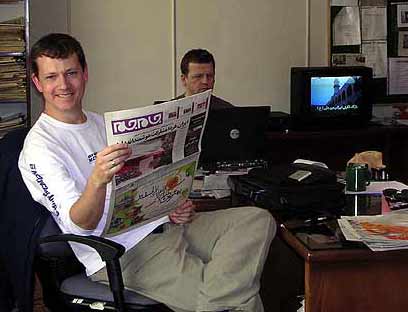
Thanks to
Jeff Jarvis for the link.In an e-mail I just sent him I mentioned the fact that I'm keen to do a story about Iranian bloggers while I'm here -- if time and visa extensions allow.
With another two newspapers closed down on the eve of the election for publishing a letter by reformists barred from standing in the election, criticising Iran's Supreme Leader Ayatollah Ali Khamanei, I speculated whether Iran's media is facing another clampdown after the election. With the conservatives set to take charge of the parliament, or majlis, will they be emboldened to crack down on the media -- and will bloggers become an increasingly important news source?
I signed off my e-mail to Jeff by saying that the authorities here can silence the mainstream media -- but will they be able to silence the bloggers?
I may have already found my answer.
I tried to log on to
Hossein Derakhshan's site because from the stats it looks like he's also given me a mention. He's an Iranian living in Canada who's done a lot of work promoting and helping his fellow Iranian bloggers.
My browser gave me a stern message --
"THE REQUESTED PAGE IS FORBIDDEN. I tried a proxy server instead. Same message.
I asked my translator, Negar, to tell me more about net censorship. She explained that as well as all porn sites, anything deemed seditious is also blocked by the local ISP.
Iran Filter isn't blocked, though -- presumably because it's in English and therefore can't pollute the minds of Farsi speakers.
If anyone's able to cut and paste Hoder's blog entry about this site and e-mail it, I'd appreciate it.
posted by
Stuart at
17:47
#
Working as a journalist here in Iran is a surreal experience.
A staple of broadcast journalism is the “vox pop” – accosting people on the streets and asking them what they think about a particular subject.
On election day, many of the programmes I work for were asking for voxes so I went down to a nearby polling station with my translator, Negar, to listen to the vox of the populi.
Being able to interview people openly in public places is unusual enough in Iran. But the paranoia of the authorities over it would be laughable, were it not so serious for the ordinary Iranians who have to deal with the invasions of their privacy every day.
As soon as I took out my microphone and started talking to people, a plainclothes intelligence officer sidled up alongside. He didn’t say anything, he didn’t stop us, he didn’t take notes…he just stood there, as if poised to step in should anyone dare to criticise the regime. It was all extremely bizarre – but because we’d been rigorous beforehand in ensuring we had the right accreditation, everything was above board. On any normal, non-election day we’d have been hauled off to the nearest police station – or at the very worst subjected to the breathtakingly pointless questioning and permission checking that makes you want to tear your hair out. For the elections, though, we had our special papers – and no one could stop us.
As the day went on, the constant shadow of the authorities began to feel almost normal. Men in sunglasses followed us from a distance whenever we went. To be fair, I would have been very surprised if they hadn’t.
At one point, we turned up at a polling station to do some lives on our videophone, only to find it virtually deserted. As we set up the camera, the police officer on patrol herded up a gaggle of women in black chadors and made them queue outside – to make it look like the Great Iranian Public was itching to cast its collective vote.
At the polling station, I met two sisters who were a dream for me. Not only did they speak good English but they were also poles apart politically – one conservative, the other reformist.
I made them the centrepiece of my election day report, which you can hear
here. It’s a .wma file, is 400Kb in size and is 3’18” long.
posted by
Stuart at
17:24
#
Veteran Middle East commentator
David Hirst, author of the classic work
The Gun and the Olive Branch is staying downstairs from the bureau with Jim and is also
working out of our office.Read his latest despatch for the Guardian on the Iranian elections
here.
posted by
Stuart at
15:21
#
Getting reacquainted with Jim Muir...
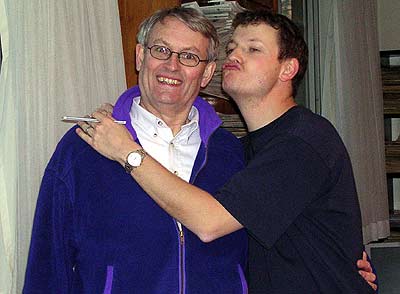
posted by
Stuart at
14:48
#
I'm quite proud of this -- my first Iranian videoblog, perhaps
the first Iranian videoblog. Filmed, edited, encoded and uploaded entirely on location.
It's my analysis of the election results so far and is just over 400Kb in size:
Videoblog: Iranian Election Analysis (.wmv)
posted by
Stuart at
14:46
#
posted by
Stuart at
08:57
#
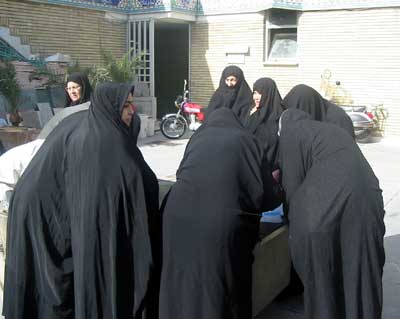
The rollercoaster of news stories that have landed in my lap since I arrived here in the early hours of Wednesday morning has meant that it was only on election day that I was finally able to get out and about onto the pollution-choked streets of Tehran to “gauge the mood” – as journalists are fond of doing.
Until then, my picture of modern Iranian society had been a fragmentary one. For me, it was summed up by the behaviour of the bureau’s assistant, Negar.
She arrives at the office every morning dressed in long black coat and modest hejab. As soon as she’s indoors, though, she takes off her headscarf to uncover her hair. Beneath her coat, Negs wears western clothes.
It’s not every day that a foreign journalist with a microphone and a camera can walk up to an ordinary Iranian and ask them what they think about their country’s political system – and simply walk away afterwards.
On any normal day, gauging opinion on the streets of Tehran would instantly attract the attention of one of the many branches of Iran’s security forces – the Revolutionary Guard, the police, or undercover intelligence officers.
But election day for the seventh Iranian parliament, or majlis, was no ordinary day. More than 200 foreign journalists are reporting on the elections – and the authorities are eager to show their country in its best light.
At a polling station in the prosperous suburb of Niavaran, in northern Tehran, voters – and some who have simply turned up out of curiosity or to give moral support to relatives -- were eager to express their views, even if many are less willing to give their names or have their photographs taken.
Long lists of candidates hang are posted along the walls of the polling stations. But the names of many would-be candidates were absent. Prior to the election Iran’s hardline Council of Guardians, an unelected watchdog, banned around two and a half thousand reformist politicians from standing.
The reformists, already under pressure over their perceived failure to fulfil their promises to liberalise Iranian society, decided to boycott the poll.
Many voters followed suit, including translator Bahar Irani.
“The candidates standing only represent about 10% of the population,” she told me.
“If the candidates don’t represent the population then it’s not a real election.”
Bahar Irani had only turned up at the polling station to accompany her sister, Noushid Najafi.
Although blood relatives, the two share very different political views – one a reformist, the other deeply conservative, a fact highlighted by her flowing black chador covering her entire body.
“It’s not because I’ve been tortured or anything like that I’ve chosen to vote,” Noushid said.
“It’s my right to vote, I want to vote, and that’s why I’ve done it.”
For some Tehranis, though, the ideological divide between conservatives and reformists is a side issue.
“All politicians are as bad as each other,” said Zohreh Sadri.
“They only think of themselves and their own wallets – and that goes for those who vote for them as well.
“If the turnout is low it’ll show that the politicians aren’t representing the will of the people.
“The whole election is a sham.”
That’s a sentiment shared by Ali Sami’ee, a 22 year old student.
“We do have a parliament here but as long as there is an unelected body like the Council of Guardians then parliament will basically be powerless.
“Whether we like it or not, the regime will be the overall winner.”
As I left Ali Sami’ee and walked away from the Niavaran polling booth he was immediately approached by a plainclothes intelligence officer and questioned about our conversation.
Old habits die hard in Iran – even on election day.
(A version of this entry can be found
here.)
posted by
Stuart at
08:50
#
Friday, February 20, 2004
Apologies for the light blogging, which is due to a combination of a piss-poor internet connection and a never-ending workload.
I've been out at polling stations this morning, reporting and gathering material, which will make its way onto the blog once I get time to find a faster net connection.
posted by
Stuart at
11:45
#
Thursday, February 19, 2004

Earnie is God. Fact. He should be canonised without delay.
BBC Sport: Wales 4-0 Scotland
posted by
Stuart at
06:15
#
Something completely non-Iran related....as well as watching terrible films on the flight over here I also put together a videoblog from last week's trip to Tenerife.
It's the first one I've edited using
Adobe Premiere instead of
Videowave. I found it a much more powerful piece of software, if a little frustrated and complicated to use -- although I'm sure that's just because I'm not completely familiar with it.
So, here's a videoblog shot in the Teide National Park. I've cut out the audio track because it was just the sound of howling wind -- so it's just nice pretty pictures.
Videoblog: Teide National Park (.wmv)
posted by
Stuart at
06:04
#
My first day in Iran certainly didn’t turn out as expected.
After a few hours’ sleep I crawled through Tehran’s traffic-choked streets to the BBC’s house-cum-bureau. As our driver, Nadar, inched along I admired the snow dusted Alborz mountains to the north of the city and reflected on the fact that the last time I’d travelled in his 4x4 it was on the way to the hospital in Kifri, my severed foot wrapped in a scarf. Kaveh lay dead on the back seat. It was the most eerie feeling and I chose to sit in the front seat, too spooked to re-enact that fateful drive too accurately.
Coincidently, Nadar is himself a right below-knee amputee. He lost his leg to a mortar round 20 years ago as a soldier fighting in the Iran-Iraq war. But unlike me, he drives a car with a manual transmission – quite a challenge for someone with no feeling and limited movement in their right foot. He’s promised to teach me how to do it.
I found the Tehran bureau a relaxed and inviting place to work, a complex of interconnecting open plan rooms cluttered with newspapers, broadcasting equipment and assorted memorabilia. Two framed photos of Kaveh hang above the fireplace, one of them edged with a black ribbon.
A communal kitchen and dining room, shared with correspondents from the Guardian and the Financial Times, gave the place the air of a bohemian alternative magazine rather than the base for some of the Middle East’s most respected journalists.
I didn’t get much of a chance to admire my new surroundings.
No sooner had I unloaded the gifts and supplies I’d brought over from London (including the sausages) than the World Duty Editor rang. A train carrying petrol and chemicals had exploded in Khorasan province, in the northeast of the country. Many were feared dead.
Normally Jim would have immediately set to work – but he was heading out the door to do some crucial filming for our election preview piece. It was left to me, with a wide knowledge of Iran garnered from less than 12 hours in the country, to hold the fort.
As the dead toll rose into the hundreds, the list of requests for live interviews – or “two-ways” as we call them in the trade – grew. World Service, News 24, World TV, Radio 4, 5 Live, even Radio Scotland – all of them wanted updates on what had happened. It continued like this for 12 straight hours, by which time the number of interviews churned out was almost as high as the death toll in Khorasan.
The most tricky was question of the day came from an interviewer who asked me to tell viewers what Iran’s rail infrastructure was like. I could have told him I didn’t have the slightest clue, and that my knowledge of Iran’s rail network was about as extensive as my knowledge of Farsi, but I opted instead for a more diplomatic and non-committal answer.
As a result, no time for photos yet…but rest assured they’ll follow soon.
posted by
Stuart at
05:51
#
Wednesday, February 18, 2004
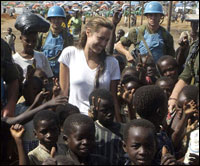
On the flight over here I caught the last half hour of
Beyond Borders, the
controversial new Angelina Jolie movie about aid workers.
Angelie Jolie filled the screen with all the presence of a shop window mannequin with an allergy to bees.
I can’t recommend it.
For a start it regurgitates every third world stereotype imaginable; oppressed and helpless peasants are brutalised by wild-eyed, crooked-toothed warlords. The “Cambodian” scenes were filmed in Thailand and the “London” scenes certainly weren’t shot in the city I live it. I suspect they were filmed on location in somewhere like Canada, to take advantage of the tax breaks.
But more importantly, it’s a deeply irresponsible piece of film making.
Every major Hollywood release is pirated onto VCDs and DVDs and sold in souks and bazaars from Tajikistan to Taipei. A movie about an aid worker who smuggles weapons in crates full of prosthetic limbs and humanitarian supplies will cause confusion and distrust among the very people the NGOs portrayed in it are trying to help.
Hopefully by now I’ve put you off, but if not look away now if you don’t want me to spoil the ending. It features the oldest landmine cliché in Hollywood. Miss Pouty Lips rescues the love of her life -- renegade doctor Nick -- from bandidos (wild-eyed, crooked-toothed, of course) in war-torn Chechnya, only to step on a mine while running for help. She steps on the device and CLICK! suddenly realises what she’s done. Angelina stands there for a moment, frozen to the spot, knowing that as soon as she moves her foot she’s going to get wasted.
Then -- BOOOMSKI! She lifts her foot and goes up in smoke, leaving a big crater and thick clots of collagen spattered all over the battlefield.
Good riddance. It was a crap film anyway. Can we go to the pub now, please?
Nice dramatic climax but sorry, it doesn’t happen in real life (and I think I’m able to speak from experience, don’t you?). As any mine clearer (or victim) will tell you, landmines are triggered by stepping ON them, not OFF them. The pressure pad on top pushes down a plunger which detonates the explosive charge in the mine and voila – your foot’s bacon.
And Angelina of all people knows that.
I’ll forgive her, however, because she
does look spectacular in a sweaty vest.
posted by
Stuart at
07:39
#
Tuesday, February 17, 2004
More evidence that all is not well in Athens. Following complaints last week by the Paralympians,
The Telegraph (registration required) now reports on rising fears over the steel-and-glass dome at the Olympic Stadium.
The high-tech roof was the source of much concern when I visited the site -- as well as anger that a Spanish architect, Santiago Calatrava, had been chosen to design it rather than a Greek one.
However, roofs (or is it rooves?) are less of a problem for cigar-chomping Arnold Schwarzenegger,
who's apparently planning to tear the lid off the state capitol in California so that politicos can enjoy a stogie. As a fan of Cuba's finest export myself it's a measure I heartily endorse.
Meanwhile, in this age of interconnectivity and global communication, the Telegraph also has a
delightful story which shows that the human race is still capable of throwing up the odd surprise. In this case it's a newly discovered language spoken only by a few hundred Siberians living along the Chulym river near western Mongolia. Fabulous.
posted by
Stuart at
15:34
#
One I've only just picked up on because of last week's holiday;
The New York Times says Ralph Nader will decide within the next week or two whether there is enough grass-roots support for him to run for president.
My sense,
based on what he said in the interview I did with him a few weeks ago in Washington, is that he'll go for it -- and get nowhere.
Maria Recio of Knight Ridder has more on the possibility of Nader for Prez 2004.
posted by
Stuart at
11:48
#

For anyone who travels frequently on business, it's the little things that make a big difference.
Most of my colleagues working in foreign news have a special treat or favourite item they slip into their suitcase. For me, it's Havana cigars. For others it's a certain type of bubble bath, a much-watched DVD or a collection of trashy novels. These little luxuries can mean the difference between surviving a difficult assignment with one's sanity intact and going under.
So it came as no surprise when I got a call from Tehran on a dodgy mobile phone line. It was Jim. "Can you bring me out some vegetarian sausages?" he asked.
But not just any vegetarian sausages.
"I'm addicted to the ones made by
Cauldron," he said. "And make sure you get the Lincolnshire variety."
The shopping list went on.
"And some soap. I'm almost out of soap. Something gentle on the skin."
A quick trip to my local Sainsbury's and five boxes of Cauldron Vegetarian Sausages (the Lincolnshire variety) were in my suitcase.
A soothing lather for a dry-skinned Tehran Correspondent I'll pick up at the airport.
posted by
Stuart at
11:41
#
Here's
The Economist's take on the Iranian elections.
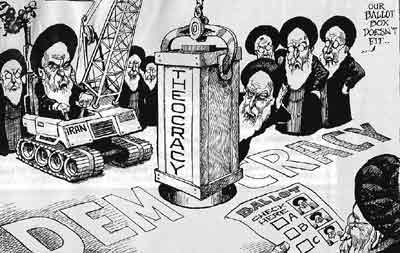
posted by
Stuart at
11:14
#
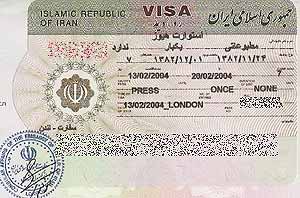
It may just be a single piece of paper with a signature on it but right now it's the most precious thing I own.
It's my sought-after visa for entry into Iran. So far, I'm the only London-based English language BBC journalist to be issued with one, so I'm guarding it with my life.
I fly out to Tehran this afternoon.
posted by
Stuart at
09:24
#
Monday, February 16, 2004
Thanks to Steve for this link to a story about a subject very close to my heart:
BBC News Online: 'Shocking' rise in disabled parking abuseThe survey was carried out by the campaign group
Baywatch.
posted by
Stuart at
20:13
#
Aside from the immediate trip to Iran, another story I'll be covering later this year is the Olympics followed by the Paralympics.
I'm keen to do the Paralympics for personal reasons as much as anything, to see how other amputees and so-called "disabled" people are overcoming their difficulties.
But
according to BBC Sport Online, Athens isn't ready to host the Paralympics.
"There is a lot of work still needed, especially with obstacles in the way on the pavements," says the
International Paralympic Committee.I can well believe it. During my recent visit to Athens to see the Olympic venues it was clear that the city's a nightmare for people with mobility problems. We're facing our own problems, too. Our "live position" for TV interviews in the International Broadcast Centre is halfway up a flight of stairs with no lift-- not great if you're trying to get up there in a wheelchair, as many Paralympians will be.
Yet strangely,
this IPC press release is more diplomatically worded, painting a very different picture of Athens' readiness for the Paralympics.
posted by
Stuart at
18:44
#
Just received the latest security briefing for Northern Iraq, which highlights why my planned trip into Northern Iraq to film a documentary about my accident isn't such a good idea at the moment. It says:
"Information has been received that travel to Erbil and Sulaymaniyah should not be undertaken in the next few days.
Reason for the advisory is that Kurdish groups have given a deadline to the Islamic Party to move out by of those cities by 0900, 9 February. If this does not occur, then there is the possibility that violent confrontations may develop not only in Erbil and Sulaymaniyah but in various locations throughout Kurdistan. Some
Contractor and NGO organizations have advised their local staff and employees to stay home until recalled and informed their non-resident expatriate staffs not to travel the Kurdistan area of Iraq until further notice.Hopefully the postponement will only be temporary.
posted by
Stuart at
14:09
#
And so, after much nail-biting and repeated calls to the embassy, it seems that my Iranian visa has finally been issued, although I won't believe it until I see the stamp in my passport when I go into the office in the morning.
I plan to leave for Tehran on Tuesday and hope to blog as usual while I'm there.
It seems I'm one of the lucky ones. A number of BBC journalists, including some
high profile ones, look unlikely to be allowed in.
It'll be an emotional assignment for me. One of the main reasons I want to go to cover the Iranian elections was so I can visit Kaveh's grave and meet his family. Also, it'll be the first time I've worked with Tehran Correspondent Jim Muir since that fateful day in Kifri almost one year ago.
The story itself, however, looks like being something of a damp squib. The right wing Council of Guardians has disqualified more than 2,000 reformist candidates from standing in the election. Even so, disillusionment with the reformists has meant the public's response has been muted.
The belief is that the election will be lacklustre, bordering on farcical, with the expected turnout being put as low as 15% by some commentators. If that turns out to be the case, it'll be bad news for reform-minded Iranians; conservatives may dominate the new parliament and president Muhammad Khatami will be further weakened.
You can follow some of the BBC's Iranian election coverage, including the latest analysis by Jim,
here. No western journalist knows Iran better than he.
Talking of which, Jim's documentary on the death in an Iranian prison last year of the photojournalist Zahra Kazemi
aired in Britain this evening -- and a compelling and measured piece of work it was too, using Kazemi's life as a prism through which to look at 30 years of Iranian history. Try and catch it if it pops up as a repeat.
posted by
Stuart at
00:28
#
Sunday, February 15, 2004
Thanks to Mark for
this tale of a ten year old Australian girl who just can't wait to have her left leg amputated.
Go easy with that kitchen knife, Natalie -- amputation is a job that should be left to trained professionals.
posted by
Stuart at
21:29
#
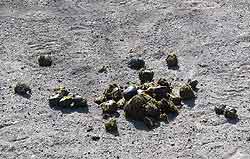
I'm back -- revived, refreshed and reeking of horse shit, from the delightful
Finca Verde ranch in the north of Tenerife.
I can't recommend it highly enough -- it's a great place to relax and improve your riding (and the travel agents -- specialist firm
In The Saddle also deserve commendation). Finca Verde's owners, Swiss couple Andrea and Markus Eschbach, are delightful and worked hard to make my week on horseback a memorable one.
Their farm, up in the hills near the
Teide National Park, is just a half hour's drive from the mass tourism arsehole of the world that is the resort of Puerto De La Cruz (I headed down there one evening to buy a couple of boxes of duty free Havanas and left again as quickly as possible). Even so, it's a world away from the beer-gutted, salmon pink skinned package holidaymaker hell.
Looking down on the rest of the world from their hillside ranch, amid the lemon trees and Canarian pines, I immersed myself in the natural horsemanship techniques pioneered by teachers such as the comically named
GaWaNi Pony Boy (surely a pseudonym) and German instructor, country singer and natty blazer wearer
Fred Rai.Though the Indian riding pioneers are easy to mock, their approach is sound. Indian riding, Andrea explained, is based on a compassionate understanding and handling of the horse. The key is knowing the behaviour pattern of horses and giving clear and consistent instructions. Once the horses are comfortable with you and vice versa, the idea goes, you can do away with painful bits, spurs and whips. The animals will respond to simple, firm commands alone.
It seemed to work. By the end of the week I -- a riding beginner -- was trotting, cantering and guiding my horse as if I'd been doing it for years. The small matter of my artificial leg constantly slipping out of the stirrups was an inconvenience but aside from that I made huge progress.
I'm rushing to get ready for my departure for Iran on Tuesday (of which more later) so there's no time to put together a crafted videoblog. It'll have to wait until I get back. For now, here's a very rough and ready horse's eye view of what hitting the trail in the hills of Tenerife is like. The .wmv file is just under 600Kb in size. To view, right click on the link, save the target onto your hard drive and then open it once it has downloaded:
In The Saddle Videoblog (.wmv)And some photos:
Teide National ParkRide 'Em Cowboy!On The Trail
posted by
Stuart at
18:36
#














